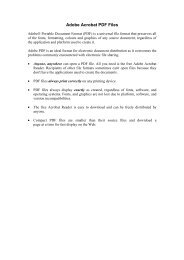- Page 2 and 3: The Public Domain
- Page 5 and 6: A Caravan book. For more informatio
- Page 8 and 9: Acknowledgments The ideas for this
- Page 10 and 11: Acknowledgments ix has been central
- Page 12 and 13: Preface: Comprised of at Least Jell
- Page 14 and 15: Preface xiii there are powerful cou
- Page 16 and 17: Preface xv balance between what is
- Page 18 and 19: 1 Why Intellectual Property? Imagin
- Page 20 and 21: Why Intellectual Property? 3 good.
- Page 22 and 23: Why Intellectual Property? 5 Instea
- Page 24 and 25: Why Intellectual Property? 7 brand
- Page 26 and 27: Why Intellectual Property? 9 welfar
- Page 28 and 29: Why Intellectual Property? 11 permi
- Page 30 and 31: Why Intellectual Property? 13 there
- Page 32 and 33: Why Intellectual Property? 15 to te
- Page 34 and 35: 2 Thomas Jefferson Writes a Letter
- Page 36 and 37: Thomas Jefferson Writes a Letter 19
- Page 38 and 39: Thomas Jefferson Writes a Letter 21
- Page 40 and 41: Thomas Jefferson Writes a Letter 23
- Page 42 and 43: Thomas Jefferson Writes a Letter 25
- Page 44 and 45: Thomas Jefferson Writes a Letter 27
- Page 46 and 47: Thomas Jefferson Writes a Letter 29
- Page 50 and 51: Thomas Jefferson Writes a Letter 33
- Page 52 and 53: Thomas Jefferson Writes a Letter 35
- Page 54 and 55: Thomas Jefferson Writes a Letter 37
- Page 56 and 57: Thomas Jefferson Writes a Letter 39
- Page 58 and 59: Thomas Jefferson Writes a Letter 41
- Page 60 and 61: The Second Enclosure Movement 43 In
- Page 62 and 63: The Second Enclosure Movement 45 No
- Page 64 and 65: The Second Enclosure Movement 47 en
- Page 66 and 67: The Second Enclosure Movement 49 ne
- Page 68 and 69: The Second Enclosure Movement 51 ex
- Page 70 and 71: The Second Enclosure Movement 53 th
- Page 72 and 73: The Internet Threat 55 The blueprin
- Page 74 and 75: The Internet Threat 57 In any event
- Page 76 and 77: The Internet Threat 59 books had im
- Page 78 and 79: The Internet Threat 61 costs, one n
- Page 80 and 81: The Internet Threat 63 to provide t
- Page 82 and 83: The Internet Threat 65 • if ingra
- Page 84 and 85: The Internet Threat 67 (4) the effe
- Page 86 and 87: The Internet Threat 69 property its
- Page 88 and 89: The Internet Threat 71 companies’
- Page 90 and 91: The Internet Threat 73 copyright in
- Page 92 and 93: The Internet Threat 75 because they
- Page 94 and 95: The Internet Threat 77 It was at th
- Page 96 and 97: The Internet Threat 79 poor peer-to
- Page 98 and 99:
The Internet Threat 81 Internet rep
- Page 100 and 101:
5 The Farmers’ Tale: An Allegory
- Page 102 and 103:
The Farmers’ Tale 85 rampant crop
- Page 104 and 105:
The Farmers’ Tale 87 for their co
- Page 106 and 107:
The Farmers’ Tale 89 not an affir
- Page 108 and 109:
The Farmers’ Tale 91 illegal than
- Page 110 and 111:
The Farmers’ Tale 93 Of course, m
- Page 112 and 113:
The Farmers’ Tale 95 to use the p
- Page 114 and 115:
The Farmers’ Tale 97 Amendment’
- Page 116 and 117:
The Farmers’ Tale 99 forbids talk
- Page 118 and 119:
The Farmers’ Tale 101 ing all ill
- Page 120 and 121:
The Farmers’ Tale 103 So the epid
- Page 122 and 123:
The Farmers’ Tale 105 put a pract
- Page 124 and 125:
The Farmers’ Tale 107 claims do n
- Page 126 and 127:
The Farmers’ Tale 109 over a tech
- Page 128 and 129:
The Farmers’ Tale 111 Store and p
- Page 130 and 131:
The Farmers’ Tale 113 is good and
- Page 132 and 133:
The Farmers’ Tale 115 the majorit
- Page 134 and 135:
The Farmers’ Tale 117 American pa
- Page 136 and 137:
The Farmers’ Tale 119 scribing bo
- Page 138 and 139:
The Farmers’ Tale 121 construe th
- Page 140 and 141:
I Got a Mashup 123 respectively, ar
- Page 142 and 143:
I Got a Mashup 125 the way America
- Page 144 and 145:
I Got a Mashup 127 see how he write
- Page 146 and 147:
I Got a Mashup 129 also defined by
- Page 148 and 149:
I Got a Mashup 131 lot of people at
- Page 150 and 151:
I Got a Mashup 133 In any event, Ra
- Page 152 and 153:
I Got a Mashup 135 caused most to s
- Page 154 and 155:
I Got a Mashup 137 But the lack of
- Page 156 and 157:
I Got a Mashup 139 This woman does
- Page 158 and 159:
I Got a Mashup 141 Today, a song is
- Page 160 and 161:
I Got a Mashup 143 Gospel Singers,
- Page 162 and 163:
I Got a Mashup 145 “onto” Bush.
- Page 164 and 165:
I Got a Mashup 147 for the work. (B
- Page 166 and 167:
I Got a Mashup 149 For fifteen year
- Page 168 and 169:
I Got a Mashup 151 to take seriousl
- Page 170 and 171:
I Got a Mashup 153 Guthrie estate c
- Page 172 and 173:
I Got a Mashup 155 plagiarist—mak
- Page 174 and 175:
I Got a Mashup 157 There is a lot t
- Page 176 and 177:
I Got a Mashup 159 creation. We cou
- Page 178 and 179:
The Enclosure of Science and Techno
- Page 180 and 181:
The Enclosure of Science and Techno
- Page 182 and 183:
The Enclosure of Science and Techno
- Page 184 and 185:
The Enclosure of Science and Techno
- Page 186 and 187:
The Enclosure of Science and Techno
- Page 188 and 189:
The Enclosure of Science and Techno
- Page 190 and 191:
The Enclosure of Science and Techno
- Page 192 and 193:
The Enclosure of Science and Techno
- Page 194 and 195:
The Enclosure of Science and Techno
- Page 196 and 197:
8 A Creative Commons If you go to t
- Page 198 and 199:
A Creative Commons 181 member of Cr
- Page 200 and 201:
A Creative Commons 183 expressive c
- Page 202 and 203:
A Creative Commons 185 FREE AND OPE
- Page 204 and 205:
A Creative Commons 187 binary-only
- Page 206 and 207:
A Creative Commons 189 assets are i
- Page 208 and 209:
A Creative Commons 191 We should pa
- Page 210 and 211:
A Creative Commons 193 modular as s
- Page 212 and 213:
A Creative Commons 195 LEARNING FRO
- Page 214 and 215:
A Creative Commons 197 architecture
- Page 216 and 217:
A Creative Commons 199 tance of cre
- Page 218 and 219:
A Creative Commons 201 creativity,
- Page 220 and 221:
A Creative Commons 203 wants to be
- Page 222 and 223:
9 An Evidence-Free Zone Perhaps som
- Page 224 and 225:
An Evidence-Free Zone 207 the issue
- Page 226 and 227:
An Evidence-Free Zone 209 harder to
- Page 228 and 229:
An Evidence-Free Zone 211 the first
- Page 230 and 231:
An Evidence-Free Zone 213 pean data
- Page 232 and 233:
An Evidence-Free Zone 215 the cases
- Page 234 and 235:
An Evidence-Free Zone 217 now just
- Page 236 and 237:
An Evidence-Free Zone 219 between t
- Page 238 and 239:
An Evidence-Free Zone 221 In one pa
- Page 240 and 241:
An Evidence-Free Zone 223 the publi
- Page 242 and 243:
An Evidence-Free Zone 225 when it i
- Page 244 and 245:
An Evidence-Free Zone 227 have gone
- Page 246 and 247:
An Evidence-Free Zone 229 example,
- Page 248 and 249:
An Environmentalism for Information
- Page 250 and 251:
An Environmentalism for Information
- Page 252 and 253:
An Environmentalism for Information
- Page 254 and 255:
An Environmentalism for Information
- Page 256 and 257:
An Environmentalism for Information
- Page 258 and 259:
An Environmentalism for Information
- Page 260 and 261:
An Environmentalism for Information
- Page 262 and 263:
An Environmentalism for Information
- Page 264 and 265:
An Environmentalism for Information
- Page 266 and 267:
Notes and Further Readings NOTES TO
- Page 268 and 269:
Notes to pages xiii-xv 251 woman’
- Page 270 and 271:
Notes to pages 6-14 253 4. Felix S.
- Page 272 and 273:
Notes to page 17 255 about Patents?
- Page 274 and 275:
Notes to page 23 257 953-1012. In a
- Page 276 and 277:
Notes to page 23 259 not use, so th
- Page 278 and 279:
Notes to pages 27-34 261 39. See no
- Page 280 and 281:
Notes to pages 36-42 263 are the on
- Page 282 and 283:
Notes to pages 43-45 265 the poem.
- Page 284 and 285:
Notes to pages 46-47 267 S. Eisenbe
- Page 286 and 287:
Notes to pages 49-52 269 31. The so
- Page 288 and 289:
Notes to pages 55-56 271 nomics of
- Page 290 and 291:
Notes to pages 67-74 273 “Movie R
- Page 292 and 293:
Notes to pages 85-88 275 of the New
- Page 294 and 295:
Notes to pages 104-116 277 13. Admi
- Page 296 and 297:
Notes 279 North Carolina Law Review
- Page 298 and 299:
Notes to pages 127-130 281 Rockin
- Page 300 and 301:
Notes to pages 148-152 283 18. John
- Page 302 and 303:
Notes to pages 161-175 285 R. Nelso
- Page 304 and 305:
Notes 287 and the Bazaar: Musings o
- Page 306 and 307:
Notes to pages 187-194 289 9. E. Co
- Page 308 and 309:
Notes 291 rights over facts. By con
- Page 310 and 311:
Notes to pages 222-228 293 9. Direc
- Page 312 and 313:
Notes to pages 239-244 295 4. “Th
- Page 314 and 315:
INDEX 2 Live Crew, 151-152. 2600: T
- Page 316 and 317:
Index 299 “by means of a computer
- Page 318 and 319:
Index 301 186, 288n3; and Sony case
- Page 320 and 321:
Index 303 169-170, 199-200, 205-207
- Page 322 and 323:
Index 305 780 F. Supp. 182 (S.D.N.Y
- Page 324 and 325:
Index 307 Jaffe, Adam, 2, 250n1, 28
- Page 326 and 327:
Index 309 Moglen, Eben, 186, 189, 2
- Page 328 and 329:
Index 311 Powell, H. Jefferson, vii
- Page 330 and 331:
Index 313 Software Publishers Assoc
- Page 332:
Index 315 Ward, Clara, and The Ward










